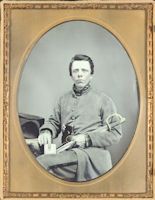Sunday, 28th—Came on to-day to Tullahoma; continues to rain night and day. I saw James Maxwell, Billy Dunson, Julius Lensing and Doc. Norwood.
Friday, June 28, 2013
June 28th. Commences with pleasant weather. Occasional firing at Port Hudson by the army mortars and great guns. At nine fifty A. M., inspected crew at quarters, and performed Divine service. Firing still going on at Port Hudson. This afternoon despatches were sent by Paymaster Meredith to Gen. Banks’s headquarters. At one P. M. an orderly came on board from the General’s headquarters. Steamer Bee came down the river, from Bayou Sara, with despatches and three soldiers of the 75th regiment N. Y. V., who were arrested at St. Francisville. From eight o’clock to twelve midnight, artillery firing heard in the rear of Port Hudson.
June 28 — Another Sabbath has found me alive and well for which I feel very thankful and glorify my heavenly Master. Things were very quiet last night. I worked nearly all night planting a battery. Sharp shooters commenced operating as usual at daylight. Lieut. Clepes of Co. E was mortally wounded this morning. He was in the trenches. W. R. C.

“The rebel cavalry is scouring the country, driving off the fanners’ stock and scaring everybody out of their wits.” –Diary of Josiah Marshall Favill.
June 28th. Reveille at daybreak and immediately afterwards breakfast. At 6 A. M. the column was en route, stepping out at a brisk pace, arriving after a march of about twenty-five miles at Monocasy Junction with few stragglers and in excellent condition.
The country we marched through to-day is very beautiful and the inhabitants greatly excited over the invasion. The rebel cavalry is scouring the country, driving off the fanners’ stock and scaring everybody out of their wits. The militia have been called out again and are hurrying to Baltimore, Philadelphia, and Washington; exactly similar proceedings to those of last September.
June 28th, 1863. The army of Northern Virginia is pushing on to the invasion of the North. In this land of ours a curious species of fault-finders has developed. While the men, the true men, are at the front, struggling with might and main to save the South from destruction, there are others, poor weak-kneed cowards, who stand on street corners and criticise President Davis and the generals in command of our armies.
These cowardly back-biters have never smelled gun powder, they are Carpet Generals and yet, to listen to them talk, you would think that the only thing needed to insure victory would be to put them in command. I turn sick with scorn when I am obliged to be present while they are exploiting their wisdom.
by John Beauchamp Jones
JUNE 28TH.—By order of Brig.-Gen. G. W. Custis Lee, the department companies were paraded to-day, armed and equipped. These, with the militia in the streets (armed by the government to-day), amounted to several thousand efficient men for the batteries and for guard duty. They are to rendezvous, with blankets, provisions, etc., upon the sounding of the tocsin. I learn that 8000 men in the hospitals within convenient reach of the city, including those in the city, can be available for defense in an emergency. They cannot march, but they can fight. These, with Hill’s division, will make over 20,000 men; an ample force to cope with the enemy on the Peninsula. It has been a cool, cloudy day (we have had copious rains recently), else the civilians could not have stood several hours exercise so well. A little practice will habituate them by degees to the harness of war. No one doubts that they will fight, when the time for blows arrives. Gen. Jenkins has just arrived, with his brigade, from the south side of the James River.
I was in the arsenal to-day, and found an almost unlimited amount of arms.
We get not a word from Gen. Lee. This, I think, augurs well, for bad news flies fast. No doubt we shall soon hear something from the Northern papers. They are already beginning to magnify the ravages of our army on their soil: but our men are incapable of retaliating, to the full extent, such atrocities as the following, on the Blackwater, near Suffolk, which I find in the Petersburg Express:
“Mr. Smith resided about one mile from the town, a well-to-do farmer, having around him an interesting family, the eldest one a gallant young man in the 16th Virginia Regiment. When Gen. Longstreet invested Suffolk a sharp artillery and infantry skirmish took place near Mr. Smith’s residence, and many balls passed through his house. The Yankees finally advanced and fired the houses, forcing the family to leave. Mrs. Smith, with her seven children, the youngest only ten months old, attempted to escape to the woods and into the Confederate lines, when she was fired upon by the Yankee [click to continue…]






